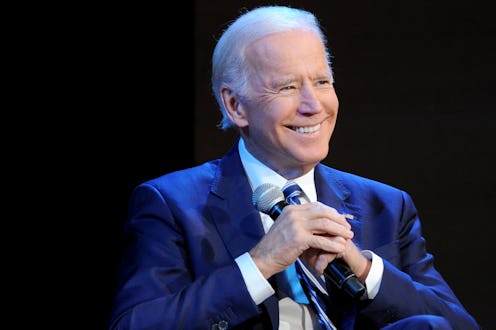News
This Is What’s Missing From The Conversation About Joe Biden’s Candidacy

Bustle’s “What’s Missing” is a column that gives space to important insights being left out of the conversation around the most talked-about news of the day. In this op-ed, writer Natalie Shure unpacks what’s missing from the conversation about Joe Biden’s 2020 candidacy.
Former Vice President Joe Biden finally entered the Democratic presidential race Thursday morning, after months of speculation that was so strong, his name was included on presidential primary polls well before he ever declared. Those polls have been very kind to him: He’s consistently occupied the top slots, and numbers show him trouncing Trump in hypothetical general election matchups. His campaign says he raised over $6 million in the 24 hours after launch, and he's supported by some Democratic Party mainstays and their influential networks. By several measures, he’s the frontrunner. But upon closer examination, he’s hardly the rock-solid shoo-in that he or his supporters make him out to be.
For starters, the support polls show for Biden seems to boil down to a plurality of primary voters who see him not necessarily as their personal favorite, but as someone they think is broadly palatable to others — thereby making him the “safest” candidate to run against Trump. Their confidence is surely fortified by his relationship to Obama, still a mega-popular figure who lent Biden’s two terms as VP a progressive sheen. When he told an audience “I’m an Obama-Biden Democrat, man … and I’m proud of it” earlier this month, he knew exactly what he was doing: affirming continuity between himself and the most progressive presidency in generations, which is sorely missed by millions of people terrified by the prospect of a Trump reelection.
In fact, the progressive record Biden purports to have barely exists. He has evolved in recent years with increasingly left-leaning stances on issues including LGBT rights and sexual violence. But throughout his political career, Biden has reliably served a specific purpose: to reassure white skeptics of social change that there was still an "adult" on their side, who not-so-secretly agreed with them that those alienating loudmouth lefties are a bit much. And aw shucks, is it really Uncle Joe’s fault if those loudmouthed lefties tended to be women and people of color?
Indeed, the run-up to Biden's announcement has prompted much relitigation of his record, and one can’t help but notice just how many times he’s been on the wrong side of history. He sided with white parents against school desegregation efforts in the 1970s; championed multiple anti-abortion measures; palled around with the notorious Southern segregationist Strom Thurmond; fought on the front lines of the War on Drugs; wrote the 1994 Crime Bill that is largely credited with accelerating racially disproportionate mass incarceration; frequently sided with financial institutions over consumers; facilitated the congressional steamroll of Anita Hill in her testimony against then-Supreme Court nominee Clarence Thomas; and has a habit of showing unwanted affection to women he barely knows. The man is a sentient list of deal-breakers a half-century long.
Given Biden’s multitude of conservative bonafides, it’s amazing he’s ever been allowed to play the progressive card to begin with. I recently found myself wondering why, exactly — given Obama’s robust progressive mandate and the enthusiastic, young, liberal coalition who buoyed him — Obama even chose Biden as a running mate at all. Had Obama’s team forgotten to vet this guy, or what?!
His political career has had less to do with combating racism than with laundering it into policies that made white people comfortable.
It was a stupid question to ask myself. Biden played the role of the experienced “nice white fella” who keeps other “nice white fellas” from freaking out over a Black president who promised something as wacky as “hope and change.” Once Obama was elected, droves of those “nice white fellas” freaked out anyway, and their racist resentments were stoked in the decade since by an increasingly reactionary right-wing media. Meanwhile, millions of people who could have benefitted from the kind of “change” Obama promised are still struggling. Trump’s election was the frightening result of these conditions, and his presidency has undeniably empowered racists, nativists and the ultrarich.
Biden, of course, didn’t cause this white supremacist resurgence — but it’s still notable that his political career has had less to do with combating racism than with laundering it into policies that made white people comfortable at the expense of black communities.
To his credit, Biden is at least aware of the horrors now unfolding. The 2017 white supremacist “Unite the Right” rally, at which a neo-Nazi murdered a young protester with his car, formulated the basis of Biden's first campaign video, overlaid with the assertion that “we’re in a battle for the soul of this nation.”
He’s right that we’re living through a terrifying historical epoch, and few moments encapsulate it quite like Charlottesville. But it’s tough to imagine a worse fit for the fight against Trump and all that he represents than Biden, whose most credible claim to anti-racist politics boils down to the VP job he clinched with his credentials as a “safe” elder statesman. As Jamelle Bouie put it in The New York Times, “for decades Biden gave liberal cover to white backlash.”
The search for silver lining can be a demoralizing one, but if there’s any to be found in the Trump era, it’s this: His grotesque racism, cruelty, greed, and that of those around him, have galvanized opposition to everything his governing coalition stands for. Defeating the Trumpian political vision requires building multiracial solidarity and genuinely confronting the ruling class he enriches at the expense of all others. Joe Biden offers neither.